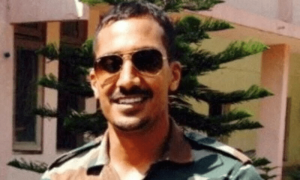WASHINGTON: There is increasing evidence that India could launch a pre-emptive nuclear strike to prevent Pakistan from using the option first, says an expert.
“India will not allow Pakistan to go first. And that India’s opening salvo may not be conventional strikes trying to pick off just Nasr batteries in the theatre,” Vipin Narang, an Indian-origin nuclear strategist from the prestigious Massachusetts Institute of Technology (MIT), told a seminar in Washington on Monday.
Nasr is a vehicle that Pakistan uses for carrying its tactical battlefield nuclear warheads.
India would launch “a full ‘comprehensive counterforce strike’ that attempts to completely disarm Pakistan of its nuclear weapons,” Dr Narang said.
He explained that policy-makers in New Delhi decided to go for the nuclear option to ensure that “India does not have to engage in iterative tit-for-tat exchanges and expose its own cities to nuclear destruction”.
Mr Narang said he was not basing assessment on fringe extreme voices such as those of Bharat Karnad or retired Indian Army officers frustrated by the lack of resolve they believe their government had shown in multiple provocations.
This assessment, he said, was based on what he learned from no less than a former Strategic Forces Command C-in-C Lt Gen B.S. Nagal and from the highly respected and influential former National Security Adviser Shivshankar Menon.
“We may be witnessing … a ‘decoupling’ of Indian nuclear strategy between China and Pakistan. The force requirements India needs to credibly threaten assured retaliation against China may allow it to pursue more aggressive strategies — such as escalation dominance or a ‘splendid first strike’— against Pakistan,” Dr Narang said.
The MIT expert argued that the conventional wisdom that a nuclear war in South Asia could start with a terrorist attack from Pakistan may no longer be valid.
The conventional wisdom envisages that a strong Indian reaction to a terrorist attack from Pakistan would lead to Islamabad using its tactical nuclear weapons to slow down the Indian offensive, Dr Narang explained.
“India then promises what most presume is massive counter-value retaliation against Pakistani cities, leaving aside how credible or incredible that might be. This is how nuclear first use would unfold in South Asia,” he added.
But Dr Narang argued that this “conventional wisdom” might not be true any longer.
Speaking at the Carnegie International Nuclear Conference in Washington on Monday, he said that India was willing to reverse its stated no-first-use policy if it feared a nuclear attack was imminent. But a pre-emptive Indian strike, however, would target Pakistan’s nuclear installations, not urban centres, he added.
But nuclear experts in Washington warned that a strike on nuclear installations could be equally devastating as it would wipe out the adjacent urban centres as well. The experts also pointed out that Pakistan was a thin strip of land where nuclear installations were not far from urban centres.
The mainstream Indian media — including some of its leading newspapers — prominently displayed Dr Narang’s warnings on their websites. The Hindustan Times reported that Dr Narang told the conference “there is increasing evidence” to support his claim that “India will not allow Pakistan to go first”.
Published in Dawn, March 22nd, 2017














































